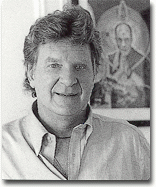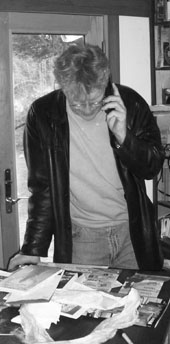|

|
"What I have learned from these people (Tibetans) has forever changed my life, and I believe their culture contains an inner science particularly relevant to the difficult time in which we live. My desire is to share some of the profound hope for our future that they have shared with me."
Professor Robert Thurman
Robert A. F. Thurman is one of the most famous tibetologists of our time, the head of the department in a Columbia University, and the first American to become a Tibetan Buddhist monk. Professor Thurman has lectured all over the world; his charisma and enthusiasm draw packed audiences.
Robert A. F. Thurman is a cofounder and president of a world-known cultural centre “Tibet House New York” created to preserve Tibetan culture. His Holiness the Dalai Lama XIV (Tenzin Gyatso) is a spiritual mentor of “Tibet House”, and Thurman’s daughter, a Hollywood star Uma Thurman, is a member of trustees council.” The Times” magazine named him one of 25 Most Influential People of America and his book “Inner Revolution”, describing how to practice Buddhism in everyday life, has become a national bestseller in America. |
|
Robert Thurman was born in 1941 in New York. “I was a very stupid young man. Anyway, when I was 17-18, I realized that American culture is even more stupid. I was trying to understand the world establishment, and I didn’t like it when the religious people said, that we are not able to understand anything and “we need just to believe” in something absolutely meaningless. I also didn’t like those European philosophers and scholars saying that it’s impossible to understand anything and we need only to study mathematics and look in telescopes…”, says Thurman in one of his interviews, - “ and somehow I felt, that I might find the answers in a more profound Indian civilization, where the knowledge I needed is preserved. I dropped the university studies and went to India as an indigent tramp. It was a beginning of 60s, there were no hippies yet, and everyone treated me very friendly, giving me shelter and food. In India I met many swami and Sufis and at last – Tibetans. At this point I felt I was at home.”
His life-long passion for Tibetan Buddhism began with an occasional meeting with a Mongolian monk Geshe Wangyal, who introduced Thurman to His Holiness the Dalai Lama in 1964 and described Robert as, "...a crazy American boy, very intelligent and with a good heart (though a little proud), who spoke Tibetan well and had learned something about Buddhism and wanted to become a monk…. Geshe Wangyal was leaving it up to His Holiness to decide." Thurman became the first Westerner to be ordained as a Tibetan Buddhist monk. He was 24 and the Dalai Lama 29. They eventually met weekly and His Holiness would quickly refer Thurman's questions concerning Buddhism to another teacher and turn the conversation to Freud, physics, and other "Western" topics, which were of interest to him. Thurman studied Buddhists philosophy, Tibetan medicine, astronomy and astrology for the whole year. He describes this phase of his life: "All I wanted was to stay in the 2 500-year-old Buddhist community of seekers of enlightenment, to be embraced as a monk. My inner world was rich, full of insights and delightful visions, with a sense of luck and privilege at having access to such great teachers and teachings and the time to study and try to realize them."
But when he returned to the United States, Thurman found that his career as a monk was not viable, so following the advice of his teacher, he decided to devote himself to studying Eastern languages to read Buddhist texts in original. “I keep on being a Buddhist, but not as a monk, and I’m happy about it. Otherwise I couldn’t have got married a wonderful woman and given birth to such wonderful children”, he says. The only lay institution in America comparable to monasticism is the university, so in the end he turned to academia. Thurman graduated Harvard University and since that time has been studying and teaching Buddhist religion.
When Thurman completed his degree and began to teach, he was appalled to discover in the Western literature and in his colleagues’ minds a massive and systematic distortion of Buddhist civilization. This misinformation came from the European authorities Weber, Freud, Marx and was perpetuated by contemporary writers and translators. They claimed that the Buddhists taught the annihilation of self and life as the highest good, and consequently are “socially apathetic” and “world rejectors”. But all this utterly contradicted to what he had seen with his own eyes – the highest lamas working during all their lives for the benefit of all beings. He also witnessed the movement, that began 2 500 years ago with the enlightenment of Buddha, to create a pure world, which basis is to help each individual to develop his or her full potential, that is enlightenment. And he had to tell the world about it!
Currently Robert Thurman is the Professor of Indo-Tibetan Buddhist Studies at Columbia University. He is a prolific translator and writer of both scholarly and popular works, including Tsong Khapa's Speech of Gold: Reason and Enlightenment in the Central Philosophy of Tibet, The Tibetan Book of the Dead, Essential Tibetan Buddhism, and his most recent, Inner Revolution: Life, Liberty, and the Pursuit of Real Happiness.
Thurman is not only a scholar, but a champion of the preservation of Tibetan culture. In 1987, he and Hollywood actor Richard Gere founded New York City's Tibet House, a nonprofit institution devoted to preserving the living culture of Tibet. |

|
![]()
![]()
![]()
![]()